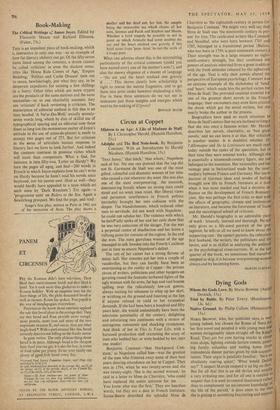Book-Making
The Critical Writings G: James Joyce. Edited by Ellsworth Mason and Richard Ellmann. (Faber, 25s.) THIS is an impudent piece of book-making, which is instructive in only one way—as an example of how far literary idolatry can go. Of the fifty-seven items listed among the contents, a dozen cannot be called 'criticism' in even the slackest sense; titles like 'Home Rule Comes of Age,' Empire Building,' Politics and Cattle Disease' turn out to mean, bewilderingly, just what they say, to be desperate expedients for earning a few shillings
• in a hurry. Other titles which are more cryptic are the products of the same motives and the same necessities—or so one charitably assumes; they are 'criticism' if hack reviewing is criticism. The masterpiece of editorial method in this line is an item. headed 'A Ne'er-Do-Well,' exactly seventy- seven words long, which by dint of skilful use of typographical spacing and an editorial note three times as long (on the momentous matter of Joyce's attitude to the use of noms-de-plume) is made to occupy two pages out of 275. But for criticism in the sense of articulate human response to literary fact we have to look further.' And indeed the contents continue to promise riches which will more than compensate. What a find, for instance, is item fifty-two, `Letter on Hardy'! We turn the pages all agog, and find-200 words in French in which Joyce explains how he can't write on Hardy because he hasn't read his novels since boyhood, nor his poems ever. (Just as well—they would hardly have appealed to a taste which set such store by `Dark Rosaleen.') Try again—a `programme note' on Riders to the Sea. Again a bewitching prospect. We find the page, and read : Synge's first play, written in Paris in 1902 out of his memories of Aran. The play shows a mother and her dead son, her last, the anagke being the inexorable sea which claims all her sons, Seumas and Patch and Stephen and Shaun. Whether a brief tragedy be possible or not (a point on which Aristotle had some doubts) the ear and the heart mislead one gravely if this brief scene from 'poor Aran' be not the work of a tragic poet.
What one admires about this is the unremitting particularity of the critical comment (could you have named every one of the mother's sons?), and also the sinewy elegance of a master of language =the ear and the heart mislead one gravely. if . . .' This shows clearly how scholarship is right to rescue the merest fragments, and to get them into print under however misleading a title. For in these three sentences do we not see in miniature just those insights and energies which went to the making of Ulysses?
DONALD DAVIE


































 Previous page
Previous page